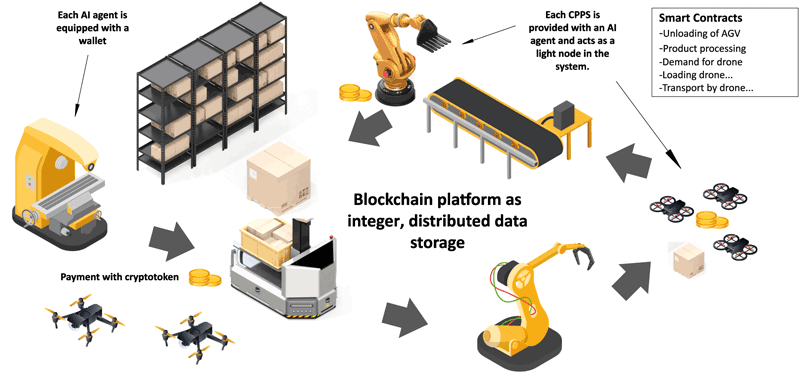by Philipp Sprenger and Dominik Sparer (Fraunhofer IML)
A new joint project between Fraunhofer IML and TU Dortmund University combines blockchain, IoT and artificial intelligence (AI). The demonstrator for “cyber-physical production systems (CPPS)” integrates smart contracts and blockchain technology into a multi-agent system at shop-floor level. The system covers negotiations, financial transactions and agile self-organisation while employing only limited hardware resources in a near real-time environment.
Today’s “cyber-physical production systems (CPPS)” are largely closed IoT applications with very limited contractual capabilities and interoperability. Integrating AI and IoT into production systems enables improvement of efficiency when it comes to finding optimal job routines in self-organised systems. The missing link here is the integration of business logic and management rules, which support contractual, administrative and financial processes to transfer the concept of CPPS to industrial operations. For this reason, researchers at Fraunhofer Institute for Material Flow and Logistics IML and TU Dortmund University are developing blockchain-based CPPS in the Innovationlab in Dortmund [L1].
The blockchain provides a distributed, tamper-proof dataspace for contractual as well as event-based data. AI-equipped software agents, which are researching and evaluating different organisational rules for better job-handling, serve as designated light nodes. This infrastructural element allows for distribution of new rules to all relevant shop-floor components via the blockchain. This feature also ensures reliability and trust for the generated transactions, which can serve as the basis for smart contract deployment [1]. The blockchain also keeps track of all agent-based decisions and distributes them within the network, so they can be adapted for different circumstances. At the same time, crypto-tokens enable autonomous micro-transactions and support monetising actions on the shop floor at low transaction costs. This way, a pay-per-use model can be introduced, even if the software and hardware equipment is provided by different stakeholders.
Simultaneously, the blockchain supports an identity management concept for CPPS without any additional intermediaries [2]. This means that the integration of the CPPS into the blockchain’s P2P-network provides every agent with a unique digital identity. This way, every transaction can easily be tracked to the device that produced it. Furthermore, agents can be introduced to or removed from the network without having to modify the system itself, greatly increasing agility and adaptability. The network itself provides the necessary legitimation for digital identities. These redundant servers, secure communication channels and digital identities assigned to all agent systems increase cyber-security and cyber-resilience [2].
In addition to this, the integration of blockchain-technology with AI-equipped agents supports decision-making processes by providing one uniform, transparent data pool and identical criteria for decision-making, effectively removing communication efforts (see Figure 1) [1]. By using smart contracts as enablers for autonomous process flows, the agent systems within the CPPS project can thus negotiate management actions and payments via micro-transactions more easily, while the blockchain-network itself is expandable more quickly and with reduced effort [1].

Figure 1: CPPS-Demonstrator.
The project is a cooperation between Fraunhofer IML and TU Dortmund University, with all experiments being conducted in the Innovationlab in Dortmund. The researchers have different expertise in self-organising systems and want to investigate how the integration of administrative business processes and applications can be executed successfully. The cooperation started in June 2019 and a proof of concept demonstration is planned for October 2019.
The CPPS-project is part of Fraunhofer IML’s “silicon economy” vision. Within this scenario, logistics, as a major driving force of extensive digitisation, is situated at the centre of platform economies. Inspired by the B2C applications of Silicon Valley, the silicon economy is the B2B equivalent, connecting artificial intelligence, global interconnectedness, data-based business models, agile financial flows as well as smart contracting and distributed ledger technologies all in one digital habitat. Originally regarded as a mere service industry, the entire logistics discipline is expressible via algorithms and can thus serve as a powerful launch pad for distributed artificial intelligence and industrial applications of biological systems, for example for swarm intelligence. Moreover, because of its interface role, logistics also demonstrate ideal conditions for widespread implementation of those technologies across various industries and, because of its network structure, across the globe. The CPPS project is set to contribute to this vision of the silicon economy to enable fast and independent means of operation at shop floor level. Like its biological role model, self-organising swarms, the project aims to develop and propel equally skilled cyber-physical production systems for industrial applications and lay the groundwork for a large-scale introduction at a later stage.
Link:
[L1] https://www.innovationlab-logistics.com/
References:
[1] K. Salah, et al.: “Blockchain for AI: Review and Open Research Challenges”, in: IEEE Access, vol. 7, pp. 10127-10149, 2019. https://doi.org/10.1109/ACCESS.2018.2890507
[2] D. W. Kravitz, J. Cooper: “Securing user identity and transactions symbiotically: IoT meets Blockchain”, in: Global Internet of Things Summit (GIoTS), Geneva, Switzerland: IEEE, pp. 1-6, 2017. https://doi.org/10.1109/GIOTS.2017.8016280
Please contact:
Philipp Sprenger, Dominik Sparer
Fraunhofer Institute for Material Flow and Logistics, Germany











